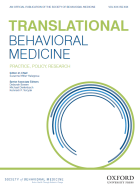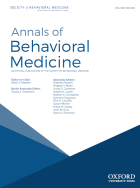
Summer 2021
Editor's Note: Thrive in the New Normal
 Hello to Summer! It’s hard to imagine we are past the first six months of 2021. As we look to the last half of the year, we can finally see a clearer path of what the future looks like. Hindsight is “20/20” and we are seeing some brighter days ahead.
Hello to Summer! It’s hard to imagine we are past the first six months of 2021. As we look to the last half of the year, we can finally see a clearer path of what the future looks like. Hindsight is “20/20” and we are seeing some brighter days ahead.
SBM’s Giving Campaign: We’re Just Getting Started

For the past two years, we have been listening to what SBM members want from their professional home. You, the members, told us that you are tired of behavioral medicine being the “best kept secret” for evidence-based decision making. In April of this year, SBM officially launched the Proven Science—Better Health Giving Campaign to build members’ skills and more widely disseminate our science to achieve better health for all.
Did Communication Inequities Worsen During the COVID-19 Pandemic? What Is There to Learn?

The COVID-19 pandemic has been marked by considerable misinformation spread and rapid changes in messaging. Examples include evolving guidelines around COVID-19 treatment, testing for asymptomatic individuals, and shelter-in-place mandates, among others. The rapid change in COVID-19-related information and guidelines continues to present a challenge in ensuring that information reaches and benefits all, particularly populations who have been overburdened by the pandemic.
Promoting Early Career Researchers in SBM: Launch of SBM’s Early Career Researcher Mentoring Program
 Welcome to the summer 2021 “Education Training and Career Development (ETCD) Council corner” of Outlook! In each issue of Outlook, the ETCD provides SBM members with opportunities and support to enhance their training and career development in behavioral medicine.
Welcome to the summer 2021 “Education Training and Career Development (ETCD) Council corner” of Outlook! In each issue of Outlook, the ETCD provides SBM members with opportunities and support to enhance their training and career development in behavioral medicine.
In this issue, we report about SBM’s first Early Career Researcher Mentoring Program and the launch during the 2021 Annual Meeting.
Adapting Professionally during COVID-19: A Conversation with Dr. India Ornelas and Dr. Reginald Tucker-Seeley


In this conversation with SBM Member Delegate Rachel Shelton, ScD, Drs. Ornelas and Tucker-Seeley share their thoughts about the transformations researchers and professional organizations have experienced over the past 18 months, and some of the changes they will continue to make in the coming years.
How to Prepare for your Telemedicine Appointment

The COVID-19 pandemic increased the need for telehealth and flexibility in the way that healthcare providers and patients meet. We have learned many techniques during this time and share these best practices from both the provider and patient perspective in this article.
Evidence to Practice: An Interview with Dr. Craig Umscheid
 Craig Umscheid, MD, MS is a practicing general internist and clinical epidemiologist who was named the new Director of the Agency for Healthcare Research and Quality’s (AHRQ) Evidence-based Practice Center Division. SBM's Evidence-Based Behavioral Medicine SIG sat down with Dr. Umscheid to talk about his transition to AHRQ and his thoughts on evidence-based behavioral medicine.
Craig Umscheid, MD, MS is a practicing general internist and clinical epidemiologist who was named the new Director of the Agency for Healthcare Research and Quality’s (AHRQ) Evidence-based Practice Center Division. SBM's Evidence-Based Behavioral Medicine SIG sat down with Dr. Umscheid to talk about his transition to AHRQ and his thoughts on evidence-based behavioral medicine.
Exercise for Cancer-related Cognitive Impairments: Bridging the Research Gaps and Moving Towards Recommendations

Cognitive impairments are a prominent quality of life complaint among cancer survivors, with those receiving adjuvant chemotherapy at highest risk. Exercise represents a potential solution. The recent physical activity guidelines for cancer survivors indicate strong evidence of physical activity’s benefits for reducing cancer-related fatigue, anxiety, and depression, all key determinants of cancer-related cognitive impairment.
How to Support New Evidence-Based Practices in Integrated Primary Care: What Can We Take from Implementation Science?

Integrated primary care (IPC) aims to improve access to behavioral health services by embedding a behavioral health provider in a primary care team or by being co-located in the clinic. The integration of behavioral health services often proves difficult. A system-level model is needed to account for the complex dynamics inherent in primary care, and implementation frameworks may help facilitate successful IPC interventions.
New Articles from Annals of Behavioral Medicine and Translational Behavioral Medicine


SBM's two journals, Annals of Behavioral Medicine and Translational Behavioral Medicine: Practice, Policy, Research (TBM), continuously publish online articles, many of which become available before issues are printed. Click below to read a selection of Annals and TBM articles that were recently made available online.
Honors and Awards
Congratulations to the following SBM members who recently received awards or were otherwise honored. To have your honor or award featured in the next issue of Outlook, please email aschmidt@sbm.org.
Members in the News
The following SBM members and their research were recently featured in journals, news articles, or videos. To have your news spot featured in the next issue of Outlook, please email aschmidt@sbm.org.
President's Message: The Urgency of Adaptation
Summer has arrived and brought with it a glimmer of hope. There is a growing sense that we may be entering the new normal as vaccination rates climb and our institutions roll out their return-to-work policies. But we are not in the clear—at least not yet. As we begin our healing, I encourage us all to reflect on both how we changed, by design and by default, over the past year, and the changes we still need to thrive in our new normal.

